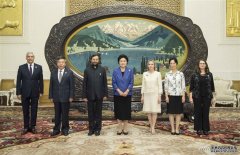Spotlight: Expert calls on more Australians to learn Mandari
By Jessica Washington
SYDNEY, June 26 (Xinhua) -- Australia is behind the times when it comes to teaching foreign languages, according to a linguistics expert who said more Australians must learn Chinese.
A split focus on learning heritage European languages and "more relevant" Asian languages is keeping Australia firmly stuck in the past, according to Professor Warren Midgley of the University of Southern Queensland, who said Australia is not making the most of its resources as a multicultural country as a tool to advance language education.
Midgley contended that there is a "stark difference" between the expectations of government policy initiatives and the reality of the educational system, stressing that Australia is severely falling behind the rest of the world when it comes to learning future-relevant foreign languages in this Asian century.
In his research, Midgley found Japanese, French, and German were the most commonly offered languages at Australian schools, but these languages being studied are not representative of demography, or even the available economic opportunities in modern Australia.
"We are absolutely stuck in the past, and part of that is it just takes so long to make a change in the language education system - it's like turning the Titanic," Midgley told Xinhua Monday.
"In the late seventies, there was a sudden realisation that Japan was a big trading partner, so there was a big emphasis on teaching Japanese, and now it is the largest in terms of popularity across schools in Australia. Japanese is still an important language but it's not the only important language."
"Things have changed, and the system is very slow in responding."
When it comes to the general public in Australia, the professor said they look upon the language fondly, and feel that it should be taught in schools, but many are put off by the difficulty in learning the language.
This difficulty almost made Michaela Weston give up her degree in Chinese language studies, frustrated by her initially slow progress.
"I felt like I was stalling, and never going to get any better - it just seemed like an insurmountable challenge, and so much more complicated than a European language," the 23-year-old told Xinhua.
"Learning Chinese wasn't my first language choice because of the difficulty, but my father convinced me to learn, and I understood it was a language that would improve my employment prospects."
After passing all of her Chinese subjects, Weston said she was glad she stuck by her decision to keep going with her studies, a decision that even led to her securing a graduate position after her eventual employer "admired her perseverance for picking such a difficult language."
An underlying "fear of failure" is preventing many students across Australia from choosing Chinese as a subject or major, Midgley said. But he believes there are a myriad of ways to make the learning of Mandarin far more accessible and enjoyable, that have yet to be embraced by the local education system.
"We have many native speakers of Mandarin across Australia, and the same for languages like Arabic. We have a huge resource in the community, with many native speakers spread right across the country, and if we tapped into that, it's a win-win."
"For students, they get a chance to speak with native speakers, not just textbook learning, and the migrants themselves have a genuine opportunity to make a major contribution to their community."
The Chinese migrant community in Australia is one of the largest. Yet Midgley believes that "dated notions" about Asian languages have led to students signing up for more euro-centric language courses despite the demographic shift.
"The Australian approach has been to do a bit of everything. A bit of the heritage languages, a bit of the currently relevant languages. So French, Greek, German, and Italian continue on as a nod to heritage languages that were quite important in the past," Midgley assessed.
"Then we have Mandarin and Japanese, and also Arabic, these languages are about looking towards the future. When you split your resources across two completely different priorities, you end up with very slow progress."
It is important to acknowledge European languages are not the only ones that are "culturally rich," and Asian languages should not just be seen as enticing from a business and trade perspective, the professor said.
"The Asian languages are seen as for business, but there is rich cultural heritage in learning these languages and that is definitely worth exploring."
"People have these romantic notions that if they do French, they can go to Paris and read the classics, which I think very few people would actually do."
University student Kasia Czarnota has experienced the differences between studying European languages and studying Chinese. Although she has no regrets about choosing Chinese, she can understand the appeal of studying European languages.
"I wanted to try something new, and something challenging, so studying Mandarin gave me the opportunity to understand China. What I found was that it was far more challenging than I expected, and there were no familiar grammatical structures to help me out," the student of the University of Technology, Sydney said.
"I have friends who started learning European languages at the same time that I started Mandarin and they can write at an academic level, and it is frustrating because I don't know if I could ever reach that same level of skill when it comes to Mandarin."
The reasons for learning Mandarin should be "fairly obvious" to the average Australian, and aside from the business and trade opportunities, foreign language education is one of the best ways to work towards social harmony in a multicultural country like Australia, Midgley said.
"We have so many native speakers of other languages in Australia, and they are our fellow Australians, our neighbors, and we shouldn't neglect that opportunity."















